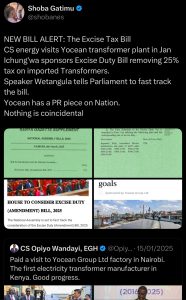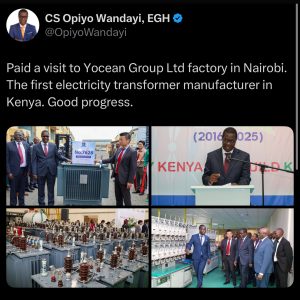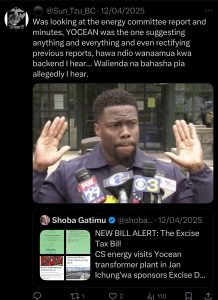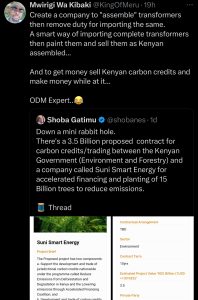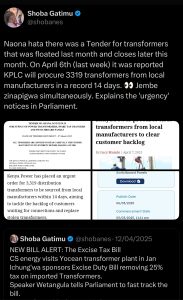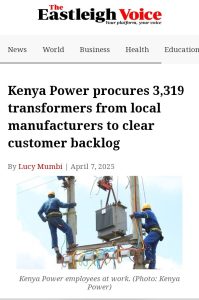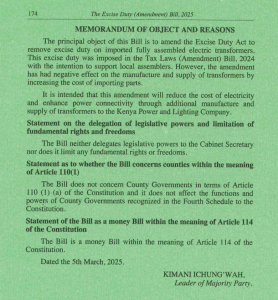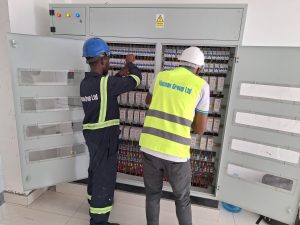Investigations
Why Yocean Group and Suni Smart Energy Are Under Scrutiny by Kenya’s Anti-Corruption Watchdogs
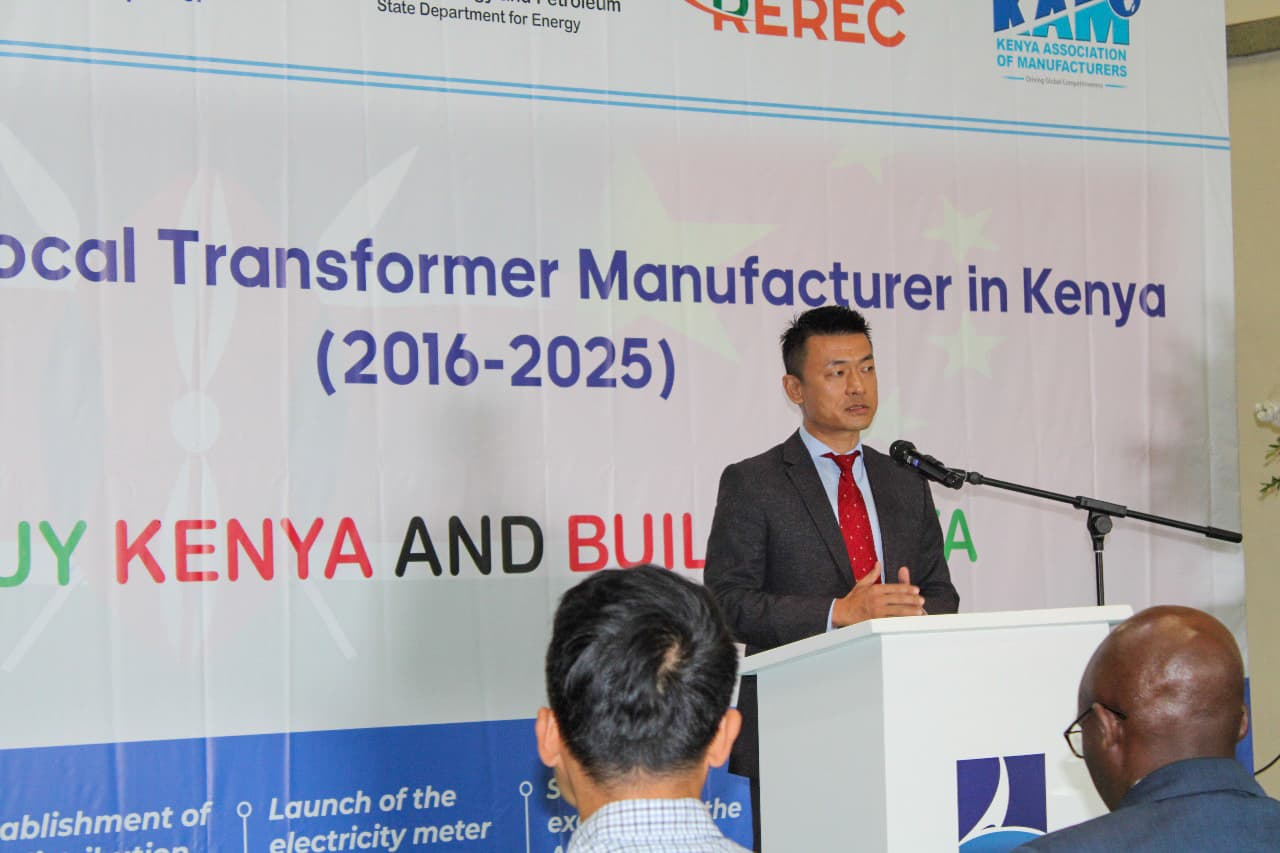
It all starts with a less publicized $3.5 billion proposed contract for carbon credits/trading between the Kenyan Government (Environment and Forestry) and a little-known company called Suni Smart Energy for accelerated financing and planting of 15 billion trees to reduce emissions.
A surface scrub of the internet shows only the firm’s website address, and that’s where suspicion creeps in—the site isn’t accessible, meaning no information or history about it can be found.
This is a red flag for a company engaged in a multi-billion dollar business with the Kenyan government but lacking a basic functioning website.
However, there’s a little relief: Xinhua, a Chinese government news agency, has run a PR piece for Suni Smart Energy, describing it as a Nairobi-based carbon consultancy company. Since there’s nowhere to verify this without a portfolio on their website, this description passes without scrutiny.
Dylan Yu, a Chinese national, has been cited as the firm’s founder, and he delivered an address at the Africa Climate Summit.
We should note the context of questionable carbon trading deals that have been happening in Africa, including Kenya, that recently led to the cancellation of a multibillion-dollar deal by the Northern Rangelands Trust after a high court sided with locals.
Additionally, the dust hasn’t settled yet following the bombshell allegations by impeached Deputy President Rigathi Gachagua about a purported dirty deal involving carbon credits between President William Ruto and Russian oligarchs.
Nevertheless, an update by the Treasury’s Public Private Partnership (PPP) Unit showed that due diligence on a proposal by privately-owned Suni Smart Energy to develop the country’s carbon credits trade was concluded in November—paving the way for final approval of the scheme.
Carbon credits are permits that allow the owner to emit a certain amount of carbon dioxide or other greenhouse gases, with the units purchased from owners of forests or other environmentally friendly assets.
The proposed project has two components, including supporting the development and trade of jurisdictional carbon credits nationwide under a program called Reduce Emissions from Deforestation and Degradation in Kenya and the Lowering Emissions through Accelerated Financing Coalition.
The Environment Ministry aims to ink a $3.5 million (Sh452.06 million) deal with Suni Smart Energy which would run over 10 years.
Yocean Group Limited
Now, Yocean Group Limited and Suni Smart Energy have one thing in common: Mr. Dylan Yu is the CEO of both. While the latter remains sketchy given scarce information, Yocean’s portfolio is in the open, and it’s because of this transparency that it has caught the eyes of many.
While the company operated under the radar without any public scrutiny, it was the hurried Excise Duty (Amendment) Bill (National Assembly Bill No. 7 of 2025) that raised eyebrows.
On its website, Yocean Group prides itself as the first local factory for distribution of transformers in Kenya, having been established in 2016. However, the events surrounding the bill told a different story.
Members of Parliament claimed that they had been duped into believing that there was a local manufacturer of transformers, only to realize the products were allegedly being imported and rebranded locally.
Here’s the backstory:
In April, Members of Parliament moved to amend a recently passed bill after it led to unforeseen negative consequences.
President William Ruto assented to the Tax Laws (Amendment) Act, 2024, in December, which then sparked backlash from key stakeholders due to its economic impact, particularly within the energy sector.
The law imposed a 25% excise duty on imported electric transformers and float glass in a bid to raise additional revenue and protect local manufacturers of electric transformers.
However, the government realized that the country does not have local manufacturers of transformers.
“It was noted that the firms indicated as local manufacturers were actually assemblers, not manufacturers,” reads the report by the Departmental Committee on Finance and National Planning, headed by Molo MP Kimani Kuria.
The National Assembly considered the Excise Duty Bill (NA Bill No. 7 of 2025), which sought to reverse the excise duty imposed on transformers.
The National Assembly Departmental Committee on Finance and National Planning invited stakeholders to submit their proposals on the new bill.
Kenya Power also supported the reversal of the excise duty, noting that the 25% tax on imported electric transformers would significantly increase the cost of electricity distribution in the country.
This change of heart by the government, along with Energy Cabinet Secretary Opiyo Wandayi’s visit to the alleged Yocean site followed by the Speaker’s directive for fast-tracking of the bill, set speculation wheels in motion.
And then, the bill gets approved.
Yocean also has been a supplier of electricity meters to Kenya Power.
Our next quest is just how influential is Mr Dylan Yu in the energy sector that he’s having his hands in every major deal? Next perhaps…
Kenya Insights allows guest blogging, if you want to be published on Kenya’s most authoritative and accurate blog, have an expose, news TIPS, story angles, human interest stories, drop us an email on [email protected] or via Telegram
-

 Grapevine1 week ago
Grapevine1 week agoAlleged Male Lover Claims His Life Is in Danger, Leaks Screenshots and Private Videos Linking SportPesa CEO Ronald Karauri
-

 Lifestyle2 weeks ago
Lifestyle2 weeks agoThe General’s Fall: From Barracks To Bankruptcy As Illness Ravages Karangi’s Memory And Empire
-

 Grapevine4 days ago
Grapevine4 days agoRussian Man’s Secret Sex Recordings Ignite Fury as Questions Mount Over Consent and Easy Pick-Ups in Nairobi
-

 Investigations2 weeks ago
Investigations2 weeks agoEpstein Files: Sultan bin Sulayem Bragged on His Closeness to President Uhuru Then His Firm DP World Controversially Won Port Construction in Kenya, Tanzania
-

 Investigations1 day ago
Investigations1 day agoMulti-Million Dollar Fraud: Three Kenyans Face US Extradition in Massive Cybercrime Conspiracy
-

 Investigations1 week ago
Investigations1 week agoEpstein’s Girlfriend Ghislaine Maxwell Frequently Visited Kenya As Files Reveal Local Secret Links With The Underage Sex Trafficking Ring
-

 News2 weeks ago
News2 weeks agoState Agency Exposes Five Top Names Linked To Poor Building Approvals In Nairobi, Recommends Dismissal After City Hall Probe
-

 Business1 week ago
Business1 week agoM-Gas Pursues Carbon Credit Billions as Koko Networks Wreckage Exposes Market’s Dark Underbelly

